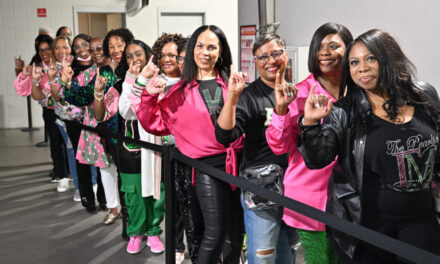BROOKFIELD, Wis. — On a balmy evening in late August, Kate Duffy and the women who help her organize Motherhood for Good were preparing to host an incumbent U.S. senator at a small house party in a suburban enclave west of Milwaukee.
There were chocolate chip cookies, a cheese tray, and guacamole and chips, along with an assortment of flavors of sparkling water. Stickers printed with an illustration of three racially diverse women holding signs and megaphones, along with the progressive-leaning group’s Instagram handle, “Motherhood for Good, Raising the Vote,” were spread across the dining room table.
Then Democratic Sen. Tammy Baldwin walked in, and the topic of conversation turned from rush hour traffic to 2024, when Baldwin is up for reelection.
To Danielle Linn, who hosted the meetup at her mother’s house, Baldwin’s decision to meet with the not-yet-year-old group spoke to the political importance of liberal-leaning, millennial-aged mothers like herself.
“We all care so much about our lives, our kids’ lives, and for so long it was, ‘Well, we keep the politics out of it,’” Linn told Baldwin. “It’s like no, that is how we make our lives better and our kids’ lives better. We have to talk about it. And we have to be engaged, or we won’t have control over what happens to our kids.”
Multiple women at the house party told The 19th that they also see their efforts as an antidote to conservative groups such as Moms for Liberty, which has pushed for banning books and school curricula that deal with race, gender identity and sexuality and has become a force in Republican politics. Motherhood for Good — and the like-minded groups operating in the same orbit — want politicians and voters alike to know that Moms for Liberty does not speak for all parents.
The focus on mothers in U.S. politics is not a new one. In 1996, the narrative was that “soccer moms” helped reelect Democratic President Bill Clinton. After the 9/11 attacks, “security moms” boosted the fortunes of Republican President George W. Bush. In 2016, “Walmart moms” helped elect Republican Donald Trump over Democrat Hillary Clinton. “Panera moms” delivered for Democrats in the 2018 midterm elections.
These political monikers nearly always referred to women in the suburbs, usually White women. But as the suburbs have gotten more racially and economically diverse, so have the moms in this coveted group of voters. An analysis of the 2020 Census by the left-leaning Brookings Institution showed that 45 percent of suburbanites were people of color, up from 30 percent in 2000 and 20 percent in 1990.
In 2020, Trump begged “suburban women” to like him, but Biden bested him among suburban women by more than 10 points, according to exit polling analysis by Edison and Voter News Service. In the 2022 midterms, suburban women supported Democrats, but within that group, a majority of White women favored Republican candidates, after backing Democrats the previous two cycles.
Motherhood for Good and other Instagram accounts run by progressive women are not waiting for campaigns to come to them but harnessing their collective power on their own, and they see the photo-sharing app owned by Meta as the best place to base their grassroots effort. Their messaging and memberships reflect the increasingly diverse areas in which they live, work and parent. They’re often motivated by gun violence in schools, reproductive rights and protecting LGBTQ+ kids — issues that resonate with the Democratic base but also a broader swath of suburban women who are swing voters or not thinking much about politics at all.
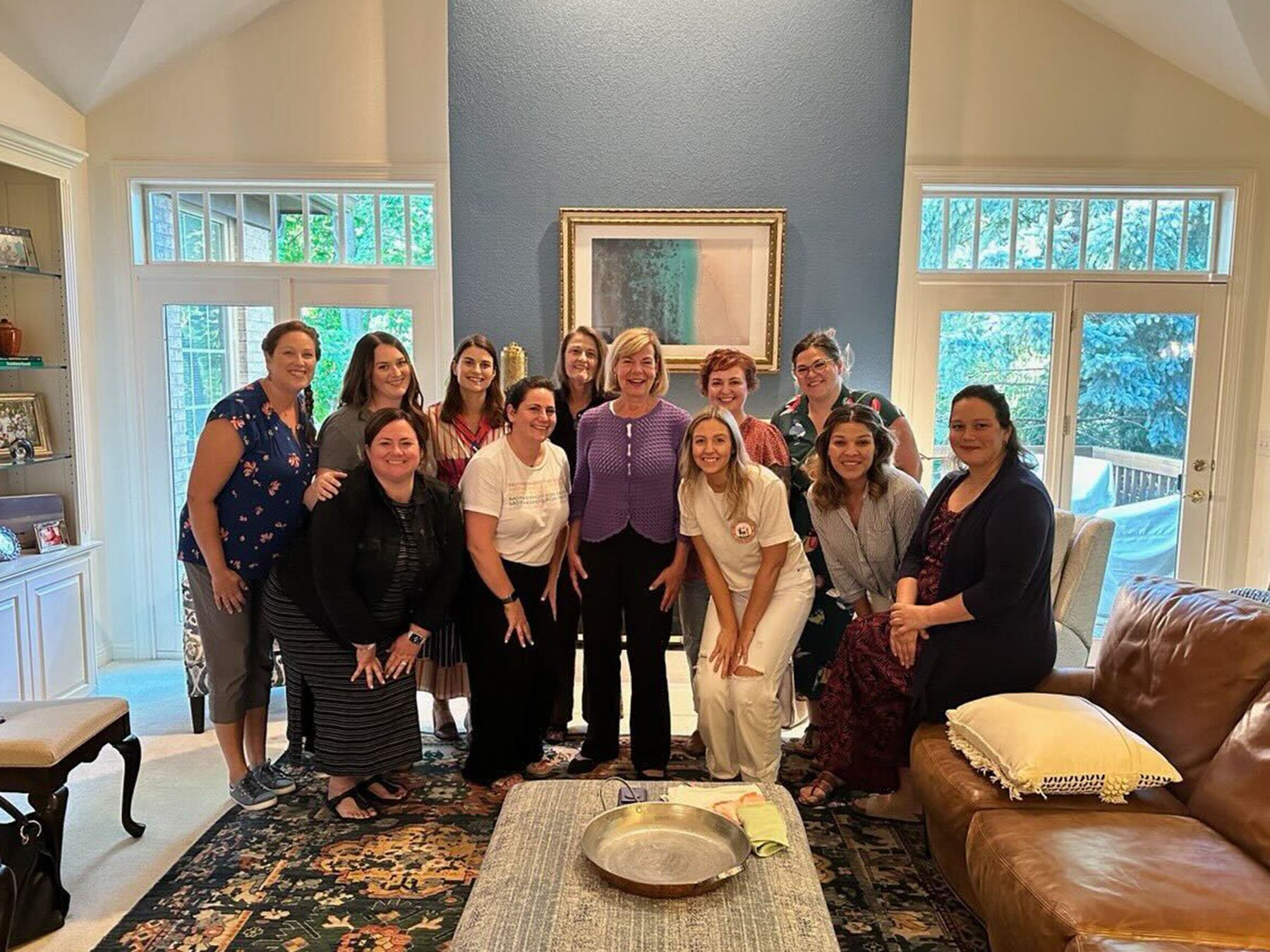
(Courtesy of Kate Duffy/Motherhood for Good)
“We are a demographic that is getting missed a lot of times by traditional Democratic messaging strategies,” Duffy told The 19th. “Moms, after the bath, before they put the kids to bed, they’re opening up Instagram quickly. But a lot of politicians, it seems like Instagram is an afterthought to them. They’ll post a graphic and some stuff but you can tell it’s not organic.”
Duffy runs the Motherhood for Good account on Instagram while holding a full-time job at a marketing agency and raising her young son and two step children. Two years ago, she’d never attended a political canvas. Now she has more than 10,000 followers and spoke about her work last month at the annual meeting of the national Women’s March.
Mattie Kahn, a former editor at Glamour magazine and author of the recently published book “Young and Restless: The Girls Who Sparked America’s Revolutions,” said it makes sense that millennial women are turning to Instagram to influence their peers. They are “digital-native people who grew up on Instagram and know how to communicate in a way that makes sense to them.”
When it comes to politics, Kahn said, these Instagram moms will be a “force to be reckoned with.”
Duffy’s own backstory began a year and a half ago, after the May 2022 school shooting in Uvalde, Texas, that left 17 elementary students and two teachers dead. She was scrolling through Instagram and came across the account of Emily Amick, a lawyer and former staffer to Democratic Senate Majority Leader Chuck Schumer.
Amick, known by her account handle Emily in Your Phone, had posted a call for political action with explicit instructions as Congress debated gun legislation. “NEW ACTION,” she wrote, listing Republican supporters of the bill in the Senate, instructions on how to find contact information for senators and representatives, scripts of what to say to them and an FAQ that answered questions like, “Can I e-mail?” (yes but calling is better) and “Should I bring up more than one issue at a time?” (no).
“I’d never called my senators or my congressperson before,” Duffy said. “She tells people how to look them up, even if they don’t know who they are — very entry-level stuff for how to get engaged and how to make a difference.”
Duffy started to think about how she could be a smaller-scale Amick for the women in her community. Wisconsin had a competitive Senate race in 2022 between Republican incumbent Ron Johnson and Democratic challenger Mandela Barnes. “I knew that the Senate race was going to be so big, so I was like, ‘Well, I’m gonna start an Instagram account called Moms for Mandela.’ And it picked up so, so quickly,” Duffy said.
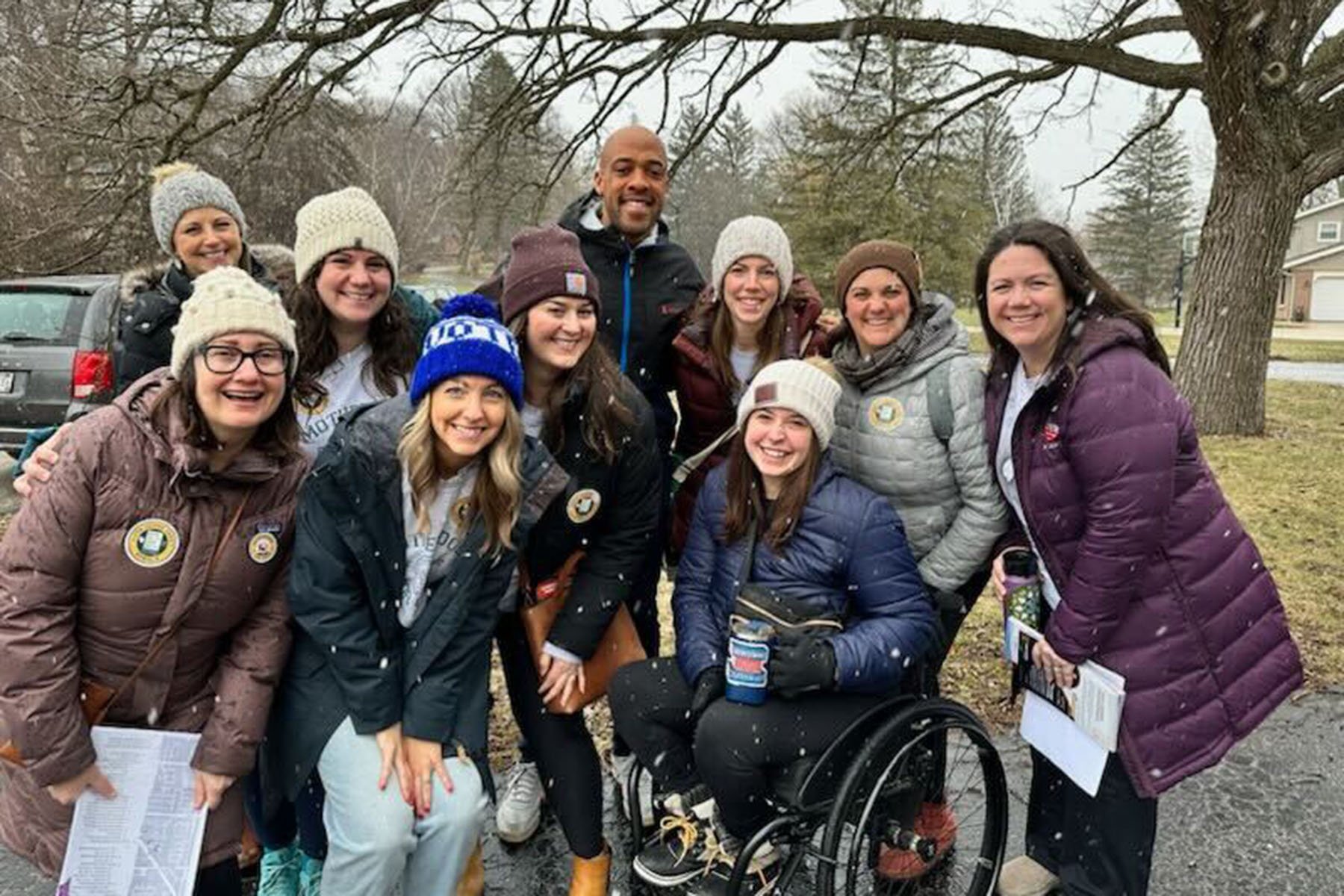
Duffy signed up to knock on doors for Barnes and remembers her heart “beating out of my chest” when the time came to canvass. Barnes’ campaign noticed Duffy’s Instagram group, which was quickly amassing followers. “It snowballed really quickly into speaking at rallies and doing stuff that I could not believe I was doing. I think part of the reason it gained traction is because I just talk to people like a normal person and don’t use some of the political jargon that comes from a campaign or a very well-established organization,” Duffy said.
Though Barnes lost, it was by fewer than 27,000 votes — a single percentage point. The women behind the Moms for Mandela account were energized. There was a looming state Supreme Court race in April 2023 that was nonpartisan but would have a profound impact on abortion policies in the state, as well as on gerrymandered voting maps. Weeks after Barnes’ loss, Duffy started a second Instagram account, Motherhood for Good, with the stated purpose of “Informing, empowering, and mobilizing moms and allies to get involved in social advocacy and political action.”
By the time now-Wisconsin Supreme Court Justice Janet Protasiewicz notched her 11-point win in the race and flipped the ideological makeup of the court, Motherhood for Good’s earnest, let-me-break-this-down-for-you posts had surpassed 1.5 million impressions and more than 10,000 shares. Amick had put Motherhood for Good on the radar of “Veep” star Julia Louis-Dreyfus, who shared a video of Duffy the day before the vote. In it, she used her son’s toys to explain Wisconsin’s gerrymandered districts in what she called a “toddler TED talk.”
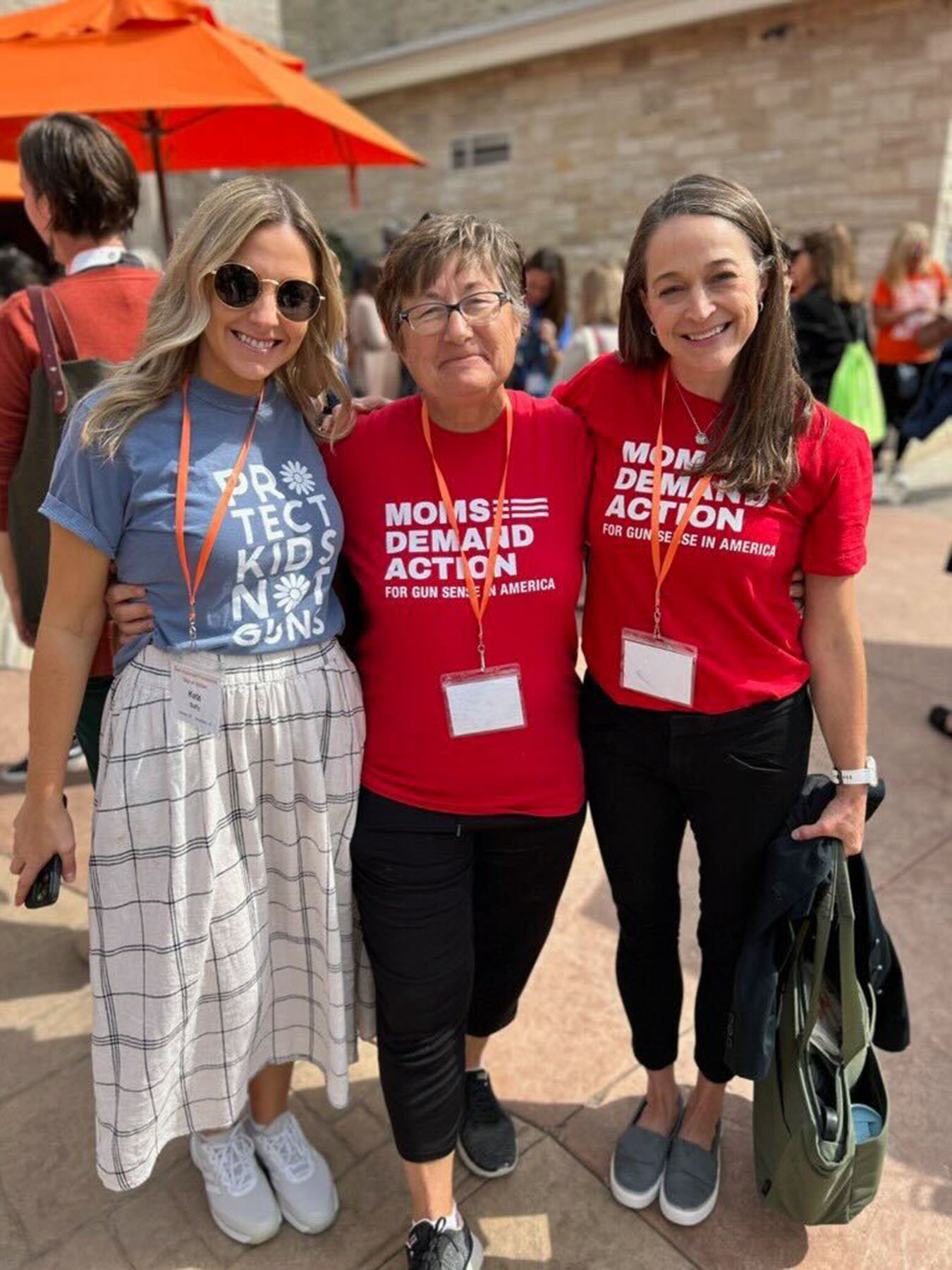
“Okay, this may be the most creative Wisconsin PSA so far,” Dreyfus said to her more than a million followers on X, the social media website then known as Twitter.
“We had so many messages after the Supreme Court election saying, ‘I would have never voted in this if it wasn’t for the type of information you guys are putting out there,’” Duffy said. “In Wisconsin, where the races are so close, suburban women are a really big voting bloc, and a lot of times they’re the moderate ones, too — so we’re in the biggest swing state, possibly in the country, and millennial-aged women are quite possibly the biggest swing bloc of voters, and we have their attention.”
Amick has become a de facto mentor to Duffy and other progressive moms wading into political influencing. She isn’t a mom herself, but as a self-described “elder millennial” who is “deeply obsessed with Instagram,” she knows how her friends and peers use the platform. At first, Amick posted photos of her dogs and home-improvement projects. Then, she saw a talking point from the far-right conspiracy movement QAnon set on a watercolor background, or, as she puts it, “QAnon made cute.” It prompted two realizations: First, that there was “concerted effort on the right to reach out to women where they are, which is Instagram.” Second, that “there were no Democrats, that I saw, on Instagram focused on reaching out to politically disengaged women on the platform that were native to the platform itself,” Amick said.
She started interspersing political content with trips to Target and appreciation posts about pumpkin spice lattes. Her friends were not only not turned off by the shift in approach, her following grew.
In late 2019, Amick started Emily in Your Phone to share informational political content about the impeachment process, lobbying and what it meant to be in contempt of Congress. The assignment, as Amick saw it, was to “create political communications that are both authentic to the platform, in the vernacular of the platform, and also that reaches out to women who are politically disengaged.”
“I’m trying to reach the exhausted majority,” Amick said.
Emily in Your Phone now has more than 130,000 followers. One is Howdy Politics, operated by Kat Vargas, a mom of three and “proud Tejana” who sat with Duffy on the panel about Instagram influencing at the recent Women’s March meeting.
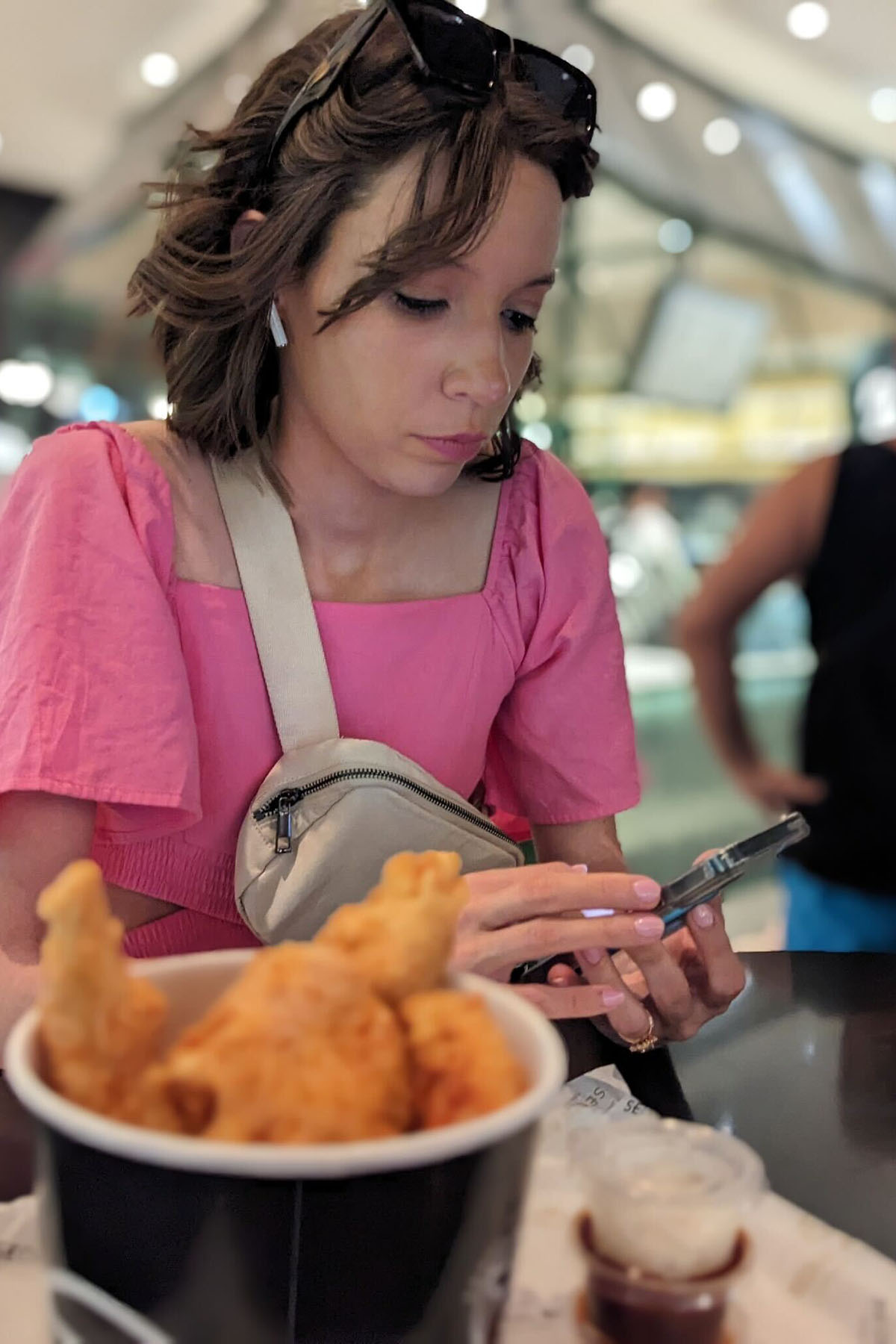
Gun violence was a motivator for Vargas, who is married to a first responder. She’s always been interested in politics; as a child, Vargas would go into her bedroom, close the door and watch C-SPAN. When Vargas started Howdy Politics at the beginning of this year, she introduced the account by saying: “Let’s be honest, politics are overwhelming and a lot of today’s commentary is focused more on hysterics than facts, causing people to check out completely.”
Vargas started breaking down the Texas legislature’s 2023 session for her followers. First she explained the specifics: They meet in odd-numbered years for 140-day sessions, and the governor can also call 30-day special sessions. There are 150 members in the state House who serve two-year terms and 31 members in the state Senate who serve four-year terms. She started a regular “Howdy DO” feature asking followers to take action by calling their elected representatives. In a recent video post, she lip-syncs to the 1999 TLC song “No Scrubs” in front of a screenshot of an NPR story about how Texas will soon permit unlicensed chaplains to be school counselors. Vargas added revised lyrics as captions: “No, don’t want religion in schools. No, I don’t want you near kids.” Howdy Politics now has more than 13,000 followers.
“This is me doing my part to reach out to millennial women like me who get left out of the conversation and who I don’t see being reached out to via traditional engagement strategies,” Vargas said, adding that women her age on Instagram are “already going there to get influenced on fashion, on beauty, so why not politics?”
Amick, Duffy and Vargas all say Instagram is the natural place for their efforts. Their peers prefer it to X, which is seen as too insidery; to Facebook, which is seen as for an older demographic; and to TikTok, which is seen as mostly for younger people. Research confirms this. Among U.S. adults, 44 percent of women report using Instagram versus 36 percent of men, according to a 2021 report by the nonpartisan Pew Research Center. Just 11 percent of U.S. adults said they regularly get news from Instagram, but 63 percent of those who did were women.
Studies show that men are more likely than women to consume news via newspapers, online news sites, radio, podcasts, and network or cable broadcasts. Social media is the only platform on which women consume news at higher rates. During a recent focus group with Wisconsin women aged 20 to 34 who were either political independents or “not-so-strong” Democrats conducted by the progressive strategy firm Navigator Research, social media was the only news source named by every participant.
Vargas points out that it is easier to moderate comments on Instagram, where you can limit commenting to only your followers or discreetly hide problematic comments from other users while leaving them visible to the poster. Duffy likes that Instagram is less snarky — at least for now. Amick believes that Instagram posts, stories and reels are better suited to wonkier educational efforts that an X thread or a TikTok video. All three women often speak directly to the camera while explaining complicated concepts while incorporating details specific to their communities. Vargas hosts a regular “Sunday sips” feature and in a recent post she shared a recipe to make a “Watermelon Mexican mule” while she updated followers on recent developments related to the attempted impeachment of Texas Attorney General Ken Paxton. Some shares are of their lives, pets and kids. Amick sees the parasocial relationships created on Instagram — in which one party feels they know a celebrity or public figure after seeing them on television or in this case following them on social media — as more suited to influencing than the two-way connections of Facebook.
Back at the house party, Duffy told Baldwin that part of what Motherhood for Good is trying to do is work on the “stigma” that talking about politics can have with women in her demographic.
Duffy asked if the group could pose with Baldwin for a photo. The women gathered in front of the hearth. They joked about who should assume a “sorority squat” to make sure all faces were visible. A staffer took a few shots.
Then Duffy broke in: “Can we get one that’s vertical for stories?”
Because, of course, they were doing it for the ‘gram.





